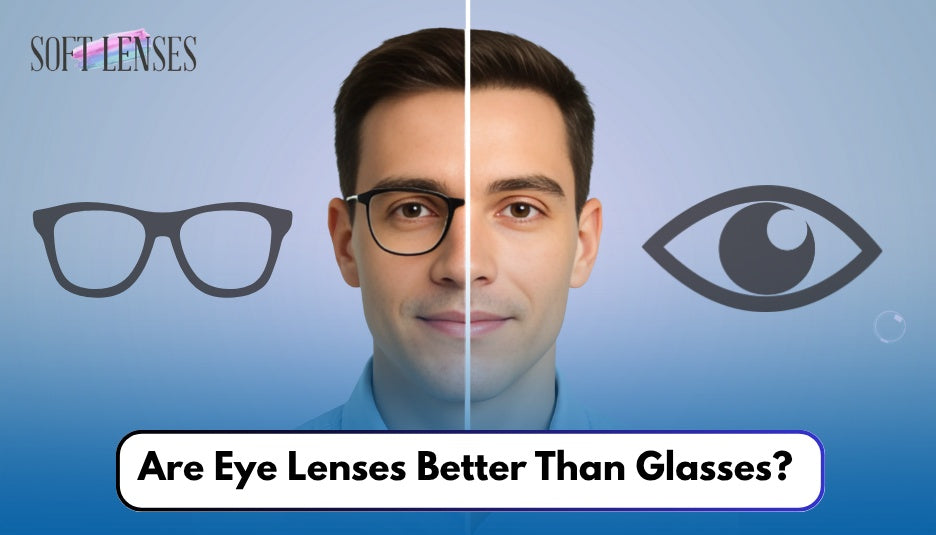Corrective vision has come a long way—from bulky early devices to today’s sleek options that blend shape and function. The two most common choices for vision correction are glasses and contact lenses.
For most people, the decision isn’t medical, it’s personal. It often depends on lifestyle, comfort, and daily eye care habits. If you’ve ever wondered, “Are eye lenses better than glasses?” you’re not alone.
This guide will break down the pros and cons of contact lenses vs glasses so you can decide which fits your eyes and your life.
Mastering the Basics
Before comparing, it’s important to understand what each option offers.
Glasses are the traditional solution: lenses fitted into a frame and worn in front of the eyes. They come in endless shapes, sizes, and materials. Glasses are safe, affordable, and easy to use.
Contact lenses, on the other hand, sit directly on the eye’s surface. They can be rigid or soft and are available as daily, bi-weekly, monthly, or even extended-wear. Contact lenses provide a more natural field of vision and certain functional advantages over glasses.
Quality of Vision: Closer Examination
If contact lenses are put side by side with glasses, the quality of vision only has to be taken into account.
Contact lenses hug the shape of the eye, provide improved field of vision, and reduce distortion. They are especially helpful for those with high prescriptions or astigmatism. Glasses might be precise in refraction, but they induce distortion at the lens periphery or are victimized by glare and reflection, especially night driving.
If you still have doubts about whether contact lenses vs glasses are better, then yes could be the answer to the average consumer, particularly the active type or that which requires peripheral vision sharpness.
Convenience and Lifestyle
Whether glass or contact lenses are better still relies on your way of life.
Active Lifestyle:
For highly active sportsmen and women, dancers, or manual workers with an active lifestyle, contact lenses are usually the most appropriate choice. They never change position, get knocked off when struck, or steam up when playing or sporting, and are therefore comparatively more convenient to wear while involved in regular sport or exercise.
Ease of Use:
Ease of use supports glasses. Glasses require no or minimal cleaning, can be removed and reinserted with ease, and do not entail touching your eyes—a luxury not all can afford.
Weather:
Outside is cold and raining, and glasses fog up or become wet, and nobody likes that. Customers will see why contact lenses are a superior convenience in the matter.
Comfort and Eye Health
Most individuals feel glasses are more of a hassle than contacts, and they are, in a large sense. Glasses never touch your eyeballs and none of the danger of lens abuse, such as infection or dry eye.
But now contact lenses are produced with excellent water absorbency and oxygen permeability, and so sensitive eyes can use them as well. If cleanliness is ensured, contact lenses may be used safely for a longer duration of time.
Still unknown are lenses for less eye-straining eyes than glasses? All depending on the individual. Some glasses dig into ears or nose, and some tire with lenses after a few hours. Wearing both under guidance can establish personal preference.
Aesthetic Appeal
Freedom of appearance is one of the non-controversy benefits of contact lenses. For those who do not wish to alter their appearance with glasses or need to display eye makeup, contact lenses provide a discreet alternative. They also come in colored forms so that one can alter eye color.
Glasses are a style statement, though. There are all shapes, types, material, and colors to pick from, so glasses are a personality matter that everyone makes the most of.
If you balance a glasses vs contact lenses decision based on appearance, you can have contacts for the occasion but glasses add personality and personality to everyday wear.
Cost Over Time
The glasses will appear less expensive on the outside. Good-quality prescription glasses will last you for years if you do not have a change in prescription. Contact lenses are a maintenance expense. If you do dailies or monthlies, you are going to be constantly replacing them, you are going to have solutions, and eye exams, and that is going to be more expensive in the long term.
But if you're a convenience person, the cost of contact lenses is typically well worth it. And if you're considering whether or not glasses or contacts are cheaper, glasses are cheaper in the long run unless you constantly break or lose them.
Eye Conditions and Suitability
Certain eye conditions will make certain things more suitable to you. For instance:
Dry Eye Syndrome:
Contact lenses dry out your eyes sometimes unless you wear specially fitted dry eye contact lenses.
Severe Allergies:
Not so nice anymore for allergy season with contact lenses.
Astigmatism:
New more advanced tech toric contact lenses make contacts a great option for astigmatic patients.
If you have a complicated prescription or eye condition, an eye care professional can advise you on which of the two best suits you: contact lenses or glasses.
Care and Maintenance
Maintenance is also a consideration when it comes to making a decision between glasses or contact lenses.
Contact lenses need regular cleaning, positioning in a manner where they won't be damaged, and regular replacement. Lack of proper cleanliness will cause severe infection or inflammation in the eyes.
Glasses are to be cleaned every now and then and do not need much maintenance in terms of not fogging and getting scratched. Glasses are comparatively more tolerant regarding maintenance.
If you are not an individual who can give a day's worth of attention, then glasses are the more intelligent and easy way out.
Environmental and Safety Factors
In the end, it comes down to lifestyle and personal needs.
Contact lenses: give freedom of vision, wider peripheral vision, and a more natural cosmetic look. Great for active people and those conscious about appearance.
Glasses: win on convenience, comfort, and long-term economy. Perfect for anyone wanting a low-maintenance option.
There’s no absolute right or wrong choice. An optometrist can help decide which works best for your eyes.
Flexibility is key:
- Glasses when comfort and ease matter most.
- Lenses when freedom and a natural look are the priority.
The smartest move? Try both under professional guidance. Whether you stick with one or use both, the best choice is the one that matches your eye health and lifestyle.

